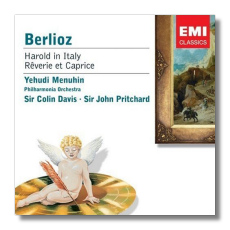
The Internet's Premier Classical Music Source
Related Links
- Berlioz Reviews
- Latest Reviews
- More Reviews
-
By Composer
-
Collections
DVD & Blu-ray
Books
Concert Reviews
Articles/Interviews
Software
Audio
Search Amazon
Recommended Links
Site News
 CD Review
CD Review
Hector Berlioz

- Harold in Italy, Op. 16 1
- Rêverie et Caprice, Op. 8 2
Yehudi Menuhin, viola 1 and violin 2
1 Philharmonia Orchestra/Colin Davis
2 Philharmonia Orchestra/John Pritchard
EMI Encore 372465-2 ADD 53:11
These recordings date from the early 1960s, and it is good to have them on CD, particularly in the budget price-range. Yehudi Menuhin was one of those rare violin virtuosos who also made recordings as a violist. It is in both capacities that he is heard here.
Harold in Italy, based on Lord Byron's Childe Harold, is a cross between a four-movement symphony and a viola concerto. It was composed for Paganini (another violin virtuoso who also played the viola), but Paganini, who had expected a showy display piece, complained that there were too many passages in which the viola was not playing. Indeed, it would be possible to play up the work's incipient drama – it ends with an "Orgy of the Brigands," after all! – but Menuhin and Davis take a different approach. While the finale is appropriately orgiastic, the performers treat the music with sophistication and restraint overall. Spectacle is handled lightly, when it is handled at all. Menuhin sounds reasonably comfortable in what must have been relatively little trod territory for him. His tone is not as rich and his manner not as giving as that of William Primrose, for example, who recorded this work with Toscanini, Beecham, and finally Munch. This is a thoughtful Harold, not a manic-depressive one. This was the first of Colin Davis's three (at least) recordings of this work. He would give it a stronger profile on his later recordings; here, he is a little anonymous, as if awed by Menuhin! Still, this is a very enjoyable reading, and the price is right.
The Rêverie et Caprice is an unusual work, because Berlioz wrote so little absolute music, and even less music for solo instrumentalist and orchestra. It turns out that this work is derived from an aria that had been intended for the composer's opera Benvenuto Cellini, so it is not so absolute after all. It is not a very display-driven piece, and Menuhin handles its modest charms nicely, with excellent support from Pritchard.
The engineering is warm and detailed, and only the absence of extended booklet notes disappoints.
Copyright © 2007, Raymond Tuttle




















